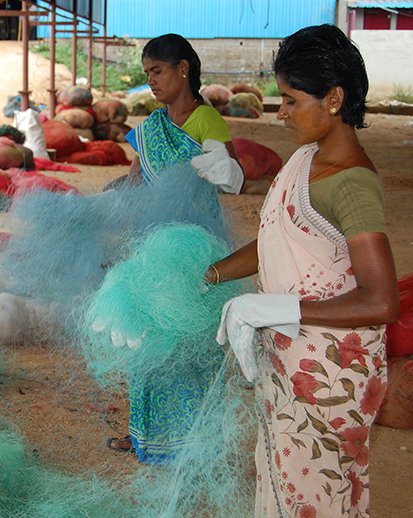Sustainability Governance Framework
Managing Board
Sustainability falls under the responsibility of the Managing Board. Specific actions in our climate action agenda are owned by members of the Managing Board and Executive Committee. In 2021, our Co-CEOs oversaw Sustainability as a key responsibility and company value as well as a driver of business growth. They Co-Chair our Inclusion & Diversity Council, and jointly oversaw our strategic partnership with the World Economic Forum.
In 2021, our Co-CEO Dimitri de Vreeze was responsible for Safety, Health and Environment (SHE) and supervised our Sustainable Procurement Program and the sourcing of electricity from renewable sources in his responsibility for the Sourcing function. He managed our engagement with organizations with a primary focus relating to climate. Within the climate action agenda, he was responsible for the upgrading of our methodology for measuring the impact of our product portfolio, for our climate advocacy efforts, and for reviewing our emissions reduction targets. He was also responsible for overall supervision of the full climate action agenda.
Our Co-CEO Geraldine Matchett oversaw our engagement with organizations with a primary focus relating to nutrition and malnutrition. She was responsible for integrating Sustainability into financial decision-making. She also oversaw our efforts and commitment toward the Taskforce on Climate-related Financial Disclosures (TCFD) recommendations. Within the climate action agenda, she was responsible for integrating climate risks into our risk management process, TCFD, carbon pricing and developing our engagement with climate-focused investors.
Supervisory Board
Our Supervisory Board has its own Sustainability Committee to oversee progress against targets and to report on the embedding of sustainability across the organization. For more details, see Supervisory Board Report.
External Sustainability Advisory Board
Comprising a diverse international group of thought leaders, DSM’s Sustainability Advisory Board acts as a sparring partner for the Managing Board and senior executives, to help sharpen their focus on strategic issues, deepen their understanding of external stakeholder needs, conduct advocacy and tackle specific issues as they arise.
The Sustainability Advisory Board met twice in 2021 together with the Managing Board and a number of senior executives. Subjects addressed included business updates, with a focus on Africa, carbon offsetting, on-farm emissions reductions and Sustell™, the food systems transformations and our proteins innovation pipeline. Due to the virtual nature of these meetings, this board was unable to include a site visit as part of the meeting. This board maintains a good balance of knowledge and a diverse composition in terms of gender and nationality.
Sustainability Advisory BoardMember
Background
Robin Chase (f)
Co-founder and former CEO of Zipcar, co-founder of Veniam and the New Urban Mobility Alliance, Board member of the World Resources Institute and Chair of Tucows. Serves as an informal advisor to many cities, national governments, and transport agencies on urban transportation planning and innovation. Nationality: American.
Ertharin Cousin (f)
CEO and Founder, Food Systems for the Future, Distinguished Fellow with The Chicago Council on Global Affairs, Visiting Scholar at Stanford University, Robert von Weizsäcker Fellow at the Bosch Academy, Senior Advisor ClimateWorks and a Board Member of Bayer S.A., Mondelez International Corporation, and Camelot North America as well as a Trustee on the Rwanda-based AKADEMIYA2063 Board of Directors. She served as the twelfth Executive Director of the United Nations World Food Programme from 2012 to 2017 and as the US Ambassador for Food and Agriculture. Nationality: American.
Paul Gilding (m)
Social entrepreneur, author and corporate strategy advisor. Fellow at the University of Cambridge Institute for Sustainability Leadership (UK). Author of The Great Disruption (Bloomsbury, London, 2011). Executive director of Greenpeace International during the 1990s. Nationality: Australian.
David King (m)
Emeritus Professor of Chemistry, University of Cambridge; Founder and Chair of the Centre for Climate Repair in the University; Chair of the Climate Crisis Advisory Group, an Affiliate Partner of SYSTEMIQ Limited; Senior Strategy Advisor to the President of Rwanda; and founder member of the Clean Growth Leadership Network; The British Foreign Secretary’s Special Representative on Climate Change 2013–2017. Nationality: British.
Ndidi Nwuneli (f)
Social entrepreneur and Founder of LEAP Africa, Nourishing Africa and Changing Narratives Africa, and co-founder of AACE Food Processing & Distribution Ltd. (AACE Foods), an indigenous agro-processing company in Nigeria. She is also the managing partner of Sahel Consulting Agriculture & Nutrition, which works across Africa, transforming the nutrition and agriculture landscapes via innovative ecosystem solutions. She is the author of the book Food Entrepreneurs in Africa: Scaling Resilient Agriculture Businesses (Routledge, 2021). Nationality: Nigerian.
Ye Qi (m)
Director of the Institute for Public Policy at Hong Kong University of Science and Technology, and Cheung Kong Professor of Environmental Policy at Tsinghua University in Beijing (China). Before joining Tsinghua, he taught at Beijing Normal University, and the University of California at Berkeley (USA). Nationality: American.
Feike Sijbesma (m)
Honorary Chairman of Royal DSM since March 2020, and former CEO between 2007 and 2020. In 2020, he acted as the Special Corona Envoy for the Netherlands. He is Chairman of the Supervisory Board of Royal Philips, non-executive Board member of Unilever and member of the Supervisory Board of the Dutch Central Bank (DNB). He co-chairs the Global Centre for Adaptation together with Ban Ki Moon and acts as an advocate and leader for business tackling climate change. As co-chair of the WEF Climate Leaders and via his membership of the Board of Trustees of the WEF, he also contributes to the expansion of Africa Improved Foods. Nationality: Dutch.
Global network
Sustainability Leadership Team
At corporate level, sustainability is steered by our Sustainability Leadership Team, a group of senior executives representing the Business Groups and contributing corporate functions, which is chaired by the Vice President Sustainability. He leads the Corporate Sustainability department and reports directly to the Co-CEOs. The Corporate Sustainability staff functions as a business-oriented center of excellence and partner on sustainability, internally and externally.
The Sustainability Leadership Team meets quarterly to monitor the progress of sustainability across the company, with particular emphasis on steering our business and innovation portfolio in relation to key drivers. Regional operational sustainability networks are in place in China, India, Latin America and North America.
Operations & Responsible Care
DSM Operations & Responsible Care has responsibility for all corporate issues related to Safety, Health and Environment (SHE). This also includes security. The Senior Vice President DSM Operations & Responsible Care reports directly to the Managing Board. SHE managers provide support at Business Group level. Our SHE Council, which includes all Business Group SHE managers, is instrumental in sharing experiences and developing best practices and communications on SHE issues.
People and Organization
Our Inclusion & Diversity (I&D) Council steers the overall I&D strategy and drives activation of our I&D program. Co-chaired by the Co-CEOs, it comprises the regional presidents and Employee Resource Group leads. In addition, the five diversity pillars are sponsored by Executive Board members.
The day-to-day responsibility for Human Rights at DSM sits with our Executive Vice President People & Organization, who chairs our Human Rights Steering Committee. This committee is responsible for the strategy and framework for managing human rights issues and is comprised of senior leaders from People & Organization, Sustainability, Legal, Procurement and Operations. These departments are further represented in the human rights working group who are responsible for the day-to-day implementation of our respect for human rights.
Taskforce on Climate-related Financial Disclosures
In her capacity as CFO, Ms. Matchett has appointed a finance executive to lead the efforts needed to address the recommendations of the Taskforce on Climate-related Financial Disclosures (TCFD). Senior leaders from various disciplines such as Finance, Risk Management, Sustainability, Insurances, Operations & Responsible Care and Sourcing worked on various initiatives in 2021 to expand physical and transition risk assessments, as well as continuing to embed climate-related risks into the overall risk management processes. For more information, see Note 3 Taskforce on Climate-related Financial Disclosures (TCFD) of the Sustainability statements.





